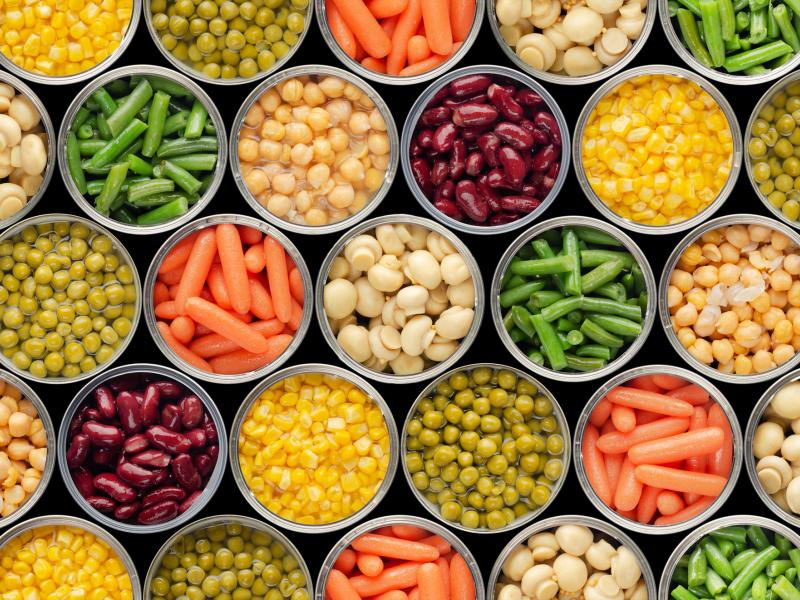Are Canned Foods Healthy?
go.ncsu.edu/readext?999725
en Español / em Português
El inglés es el idioma de control de esta página. En la medida en que haya algún conflicto entre la traducción al inglés y la traducción, el inglés prevalece.
Al hacer clic en el enlace de traducción se activa un servicio de traducción gratuito para convertir la página al español. Al igual que con cualquier traducción por Internet, la conversión no es sensible al contexto y puede que no traduzca el texto en su significado original. NC State Extension no garantiza la exactitud del texto traducido. Por favor, tenga en cuenta que algunas aplicaciones y/o servicios pueden no funcionar como se espera cuando se traducen.
Português
Inglês é o idioma de controle desta página. Na medida que haja algum conflito entre o texto original em Inglês e a tradução, o Inglês prevalece.
Ao clicar no link de tradução, um serviço gratuito de tradução será ativado para converter a página para o Português. Como em qualquer tradução pela internet, a conversão não é sensivel ao contexto e pode não ocorrer a tradução para o significado orginal. O serviço de Extensão da Carolina do Norte (NC State Extension) não garante a exatidão do texto traduzido. Por favor, observe que algumas funções ou serviços podem não funcionar como esperado após a tradução.
English
English is the controlling language of this page. To the extent there is any conflict between the English text and the translation, English controls.
Clicking on the translation link activates a free translation service to convert the page to Spanish. As with any Internet translation, the conversion is not context-sensitive and may not translate the text to its original meaning. NC State Extension does not guarantee the accuracy of the translated text. Please note that some applications and/or services may not function as expected when translated.
Collapse ▲February is Canned Food Month, but you can celebrate the convenience and affordability of canned food all year ‘round’! I’m sure the question of are canned foods healthy will arise? And, if so, here is your answer. Yes, canned foods can be just as nutritious as fresh and frozen foods because canning preserves many nutrients. The amount of minerals, fat-soluble vitamins, protein, fat, and carbohydrates remain relatively unchanged by the process of canning.
So, you can keep your pantry stocked with a variety of nutritious canned foods such as canned “no-salt-added” black beans, chickpeas (garbanzo beans), diced tomatoes, and more. Canned fruits and vegetables are great to incorporate into your healthy lifestyle. Some canned fruits have a lot of added sugars or syrups, so choose fruits packed in 100% juice or water. Some canned vegetables contain added salt, so choose the “no-salt-added” option when available. If that is not an option, you can simply drain and rinse regular salted canned vegetables to remove about 30% of the sodium.
When stocking your kitchen, it is important to have the things that you need to make any meal or substitution. Planning is essential and makes meal preparation a lot easier when you have the right staples, or basic supplies, on hand—foods that your family likes and uses often. In the cupboard, these items might be pasta, dry beans or canned vegetables that keep for a long time. In the refrigerator and freezer, these foods are ones you use often to make meals.
Use the list below to get your kitchen stocked with healthy staples. With the right basics on hand, you’ll be ready to whip up a family favorite or throw together a meal at a moment’s notice. These staples will also keep you eating healthy and out of the fast-food drive-thru.
Canned and Dry Goods
- Beans – canned or dried
- Crackers
- Crunchy cereal
- Macaroni/pasta
- Miscellaneous fruits and vegetables
- Mushrooms
- Oats
- Peanut butter
- Pizza/pasta sauce
- Rice
- Tomatoes – diced, whole, juice, sauce, stewed
- Tuna
- Vegetable broth
Having a well-stocked pantry has several benefits –
1. Save money –
Shopping to fill the pantry allows you to purchase foods when they are at significant sale or rock-bottom prices, and to stock up until the next sale.
Since food usually gets marked down in rotations, buy enough or as much as you can to last until the next sale. There’s no need to overstock!
- Eliminate multiple runs to the grocery store –
But ideally, running to the grocery store more than necessary is kept to a minimum.
3. Save time –
This is similar to the previous one. When you shop to keep items replenished and on hand, there’s some assurance you usually have something to cook for a meal.
A well-stocked pantry gives you wiggle room for the days and weeks when illness, a busy schedule, or something else throws your routine off.
Important to Remember:
Building a reasonable stockpile for your family takes time. It will mean each time you shop, purchasing extra of whatever items you can afford, and waiting a little to use them.
Slowly, staples fill your pantry and what your family usually eats can be made without darting to the store (except for some fresh items).
Toi N. Degree, Associate Family & Consumer Education Agent with North Carolina Cooperative Extension. Toi may be reached by phone at 704-216-8970 or by email at toi_degree@ncsu.edu.





